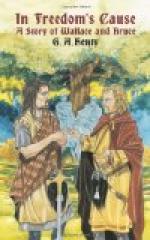“So be it!” Fergus said. “Believe me, if you raise a flame through the west the north will not hang back. And now I trust that you will remain here for a few days as my guest. All that I have is yours, and my wife and daughters will do their best to make the time pass pleasantly for you.”
Archie remained three days at the chiefs hold, where the primitive life interested him greatly. A lavish hospitality was exercised. Several sheep were killed and roasted each day, and all comers were free to join the repast. The chief’s more immediate retainers, some twenty in number, ate, lived, and slept in the great hall; while tables were spread outside, at which all who came sat down without question. The upper rooms of the hold were occupied by the chief, the ladies of his family, and the female domestics. Here they retired when they felt disposed, but their meals were served on the dais. In the evening the harper played and sang legends of deeds of bravery in the day of Ireland’s independence; and as Ronald translated the songs to him Archie could not but conclude privately that civil war, rapine, strife, and massacre must have characterized the country in those days.
At the conclusion of his stay Fergus appointed two of the retainers to accompany Archie south, and to give assurance to the various wild people through whom he might pass, that Archie’s mission was a friendly one to Ireland, and that he was an honoured friend and guest of the chief of Killeen.
On his arrival in Mayo Archie found matters more favourable to his mission. An insurrection had already broken out, headed by some of the local chieftains, originating in a broil between the English soldiers of a garrison and the natives. The garrison had been surprised and massacred, and the wild Irish were flocking to arms. By the chieftains here Archie, on explaining his mission, was warmly welcomed. As they were already in arms no urging on his part was needed, and they despatched messengers throughout the country, saying that an emissary from Scotland had arrived, and calling upon all to rise and to join with the Scotch in shaking off the yoke of England.
Archie had therefore to travel no farther, and decided that he could best carry out his mission by assisting to organize and lead the Irish forces. These he speedily discovered were beyond all comparison inferior, both in arms, in discipline, and in methods of fighting, to the Scots. For a dashing foray they would be excellent. Hardy, agile, and full of impetuosity, they would bear down all resistance instantly, were that resistance not too strong; but against stubborn and well armed troops they would break like a wave against a rock. Archie saw that with such troops anything like regular war would be impossible, and that the struggle must be one of constant surprises, attacks, and forays, and that they could succeed only by wearing out and not by defeating the enemy. With such tactics as these they might by long perseverance succeed; but this was just what Fergus had warned him they would not practise, and that their courage was rather of a kind which would lead them to dash desperately against the line of levelled spears, rather than continue a long and weary struggle under apparently hopeless circumstances.




